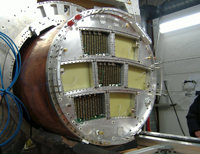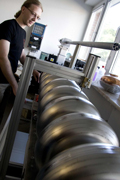 |
 |
|||||||||||||
|
|||||||||||||
|
|||||||||||||
Some ideas are so good that you have to export them when you move from one country to the other. This is especially the case in a global project like the ILC, where three regions and people from all over the place work together to make sure that whatever the LHC will find, the next generation of particle accelerators can study in detail. So when theorist Gudrid Moortgat-Pick moved from Durham, UK, to Hamburg, Germany, she took the concept of the interdisciplinary linear collider forum with her to create it in Germany. The first meeting of the new working group took place at DESY in June. The forum is supposed to gather, shake up and coordinate all activities and expertise in Germany that will be relevant for the future linear collider. There are three main topics that the attendants – around 50 at the DESY meeting – focus on: physics, machine and detectors and analysis. “We want to get everybody around the table and harvest as many synergies as possible,” explains Moortgat-Pick. Creating a Germany-wide network of all future-related machine or detector activities from labs and universities could bring solutions to problems that groups were working on in parallel and create the basis for cooperation that groups hadn't thought of before. Everything – from the ILC and the Compact Linear Collider Study CLIC and from theory to machine studies – is covered.
What does this mean in reality? Co-organiser Sabine Riemann from DESY in Zeuthen says that she learned about a cooperation between Rostock university and DESY where mathematicians and physicists from the university work on accelerator problems in close cooperation with experts at the lab. “This collaboration could be very useful for us if we run into problems,” says Riemann, who is an expert on the positron source. “And also generally speaking it is good to know what all our colleagues, including students and postdocs, are working on.” The linear collider community thinks that there is a strong case for a linear collider to succeed the LHC — but it has to make this case, too, which is another goal of the forum. Apart from a number of talks dedicated to the topic (check here for slides), the forum participants also discussed their need for real data from the LHC to keep the case. At the upcoming ILC-CLIC ECFA meeting at CERN they hope to discuss publication policies with the LHC experiments. The forum is one of many activities of the German Helmholtz Alliance 'Physics at the Terascale' and will be one of the parallel sessions at the annual Alliance meeting. The next 'open forum' is planned for spring or early summer 2011. -- Barbara Warmbein |
|||||||||||||
| © International Linear Collider |

